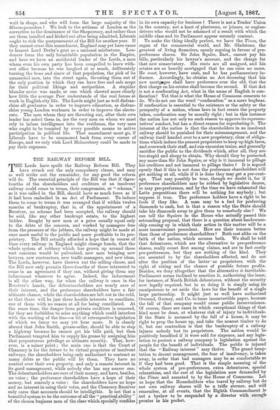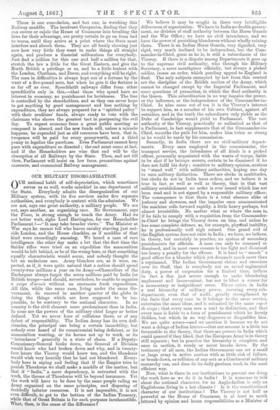THE RAILWAY REFORM MIL. T HE Lords have spoilt the Railway
Reform Bill. They have struck out the only compulsory clause, and may as well strike out the remainder, for any good the reform will do. The essential principle of the Bill was that if three- fourths of the shareholders and creditors of an insolvent railway could come to terms, their compromise, or "scheme," as it was called in the Bill, should have as much force as if it had been embodied in an Act of Parliament. To induce them to come to terms it was arranged that if within twelve months of bankruptcy, that is, of the appointment of a Receiver, no scheme had been accepted, the railway should be sold, like any other bankrupt estate, to the highest bidder. Bought by new men at a price usually equal only to the debts of the concern, and worked by managers free from the pressure of the jobbers, the railway might be made at once more useful to the public and more profitable to its pro- prietary. The Bill actually afforded a hope that in course of time every railway in England might change hands, that the -whole system of robbery which has grown up around these vast concerns would be pulverized, new men bringing new lawyers, new contractors, new traffic managers, and new ideas. The Lords, however, have thrown out the selling clause, and the Bill now only permits three-fourths of those interested to come to an agreement if they can, without giving them any inducement whatever to agree. Indeed, the inducement is all the other way, for when the railway is once in the Receiver's hands, the debentureholders are nearly sure of their interest, and the preference shareholders have a fair ultimate chance, while the shareholders are left out in the cold, so that there will be just three hostile interests to conciliate, one of them with no reason at all for being conciliated. At the same time, the danger from private creditors is removed, for they are forbidden to seize anything which could interfere with the working of the line—a bit of retrospective legislation of which we fancy we may yet hear more. It is clearly absurd that John Smith, grease-seller, should be able to stop a highway because he cannot get his bills paid, but then Parliament tempted him to supply his grease by assigning him that preposterous privilege as ultimate security. That, how- ever, is a minor point ; the main one is that the Court of Chancery is for the future to be virtual proprietor of insolvent railways, the shareholders being only authorized to contract as many debts as the public will let them. They have no control over their own property, and only a remote interest in its good management, while nobody else has any nearer one. The debentureholders are sure of their money, and have, besides, no voice ; the preference shareholders have a hope of their money, but scarcely a voice ; the shareholders have no hope and no interest in using their voice, and the Chancery Receiver only cares that accounts should be intelligible. Is not that a beautiful system to be the outcome of all the "practical ability" of the chosen butiness men of the class which specially confides in its own capacity for business ? There is not a Trades' Union in the country, not a knot of plasterers, or joiners, or engine- drivers who would not be ashamed of a result with which the middle class and its Parliament appear serenely content.
To make the thing ideally perfect, we have the Times, the organ of the commercial world, and Mr. Gladstone, the- greatest of living financiers, openly arguing in favour of pre- preference shares. Sir John Squire, Bart., cannot pay his bills, particularly his lawyer's account, and the charge for that new conservatory. His rents are all assigned, and his estates are so heavily mortgaged that he can raise no more. He must, however, have cash, and he has parliamentary in- fluence. Accordingly, he obtains an Act decreeing that his. new mortgages shall have preference over the old, that the- first charge on his estates shall become the second. If that Act is not a confiscating Act, what in the name of English is con- fiscation? Yet that is what the House of Commons consents to- do. We do not use the word "confiscation" as a mere bugbear. If confiscation is essential to the existence or the safety or the- prosperity of- a nation, whose laws in fact create the property taken, confiscation may be morally right ; but in this instance- the nation has not only no such reason to approve its represen- tatives' conduct, but has a direct reason for reprobating it. The - interest of the nation is that the shareholders in an insolvent railway should be punished for their mismanagement, and the- railway itself handed over to a new proprietary, clear of obliga- tions which induce the present proprietors to keep up high fares, and overwork their staff, and run excursion trains, and generally sacrifice the public to the dividends which, after all, they are- too stupid and sleepy to obtain. Why should they be protected. any more than Sir John Squire, or why is it immoral to pillage- his creditors and not immoral to pillage theirs ? It is argued openly that if this is not done the preference shareholders will get nothing at all, while if it is done they may get a per-cent- age. That may possibly be true, though we doubt it, for if preference shareholders may be robbed by legislative decree; so may pre-preference, and by the time we have exhausted the Latin prepositions there will be nothing for anybody ; but suppose it true. The preference holders have a right to be- fools if they like. A man may be a fool for preferring- diamonds to cash, but is that a reason why the State should take his diamonds away to give them to somebody else ? We can tell the Squires in the House who actually passed this- astounding proposal, that there is a question about landowner- ship coming up in which their action in this matter will be a most inconvenient precedent. How are their tenures better than those of preference shareholders ? Both rest alike on the- faith of the nation, which secures both. We shall be told that debentures, which are the alternative- to pre-preference shares, really count first among claims, and are in fact costly pre-preferences, but they are nothing of the kind. They are assented to by the shareholders affected, and do not alter the position of the latter-'as proprietors, with the right of voting and the chance of possible future profits. Besides, we deny altogether that the alternative is inevitable,. Parliament seems inclined to sanction it, authorizing the issue, for instance, of North British debentures, without the security now legally required, but in so doing it is simply using its- omnipotence to set aside the laws for the benefit of a single- large partnership. It might just as well have authorized Overend, Gurney, and Co. to issue inconvertible paper, because- the fall of that company would cause public inconvenience. Of course, there are cases in which exceptional things of that kind must be done, at whatever risk of injury to individuals. If the State is menaced by the fall of a house, it may be- right to prop the house up, and take the nearest timber to do- it, but our contention is that the bankruptcy of a railway injures nobody but its proprietors. The nation would be- positively benefited if it were sold for sixpence, and any legis- lation to protect a railway company is legislation against the people for the benefit of individuals. The public is injured that the "Railway interest" may thrive. The grand temp- tation to decent management, the fear of insolvency, is taken away, in order that bad managers may be as comfortable as if they had been good. That is the simple meaning of the whole system of pre-preferences, extra debentures, special relaxations, and the rest of the legislation now demanded by the Times and assented to by the House of Commons. Let us hope that the Householders who travel by railway but do not own railway shares will be a trifle sterner, and will remember, at all events, that the Eighth Commandment is not a byelaw to be suspended by a director with enough proxies in his pocket. There is one consolation, and but one, in watching this Railway muddle. The insolvent Companies, finding that they can coerce or cajole the House of Commons into breaking the laws for their advantage, are pretty certain to go on from bad to worse, until they arrive at a point where the State must interfere and absorb them. They are all busily showing just now how very little they want to make things all straight again, and produce a financial millennium for everybody. Just find a million for this one and half a million for that, stretch the law a little for the Great Eastern, and give the North British a privilege or so, and be a little lenient with the London, Chatham, and Dover, and everything will be right. The man in difficulties is always kept out of a fortune by the want of a five-pound note, but when he gets it the fortune is as far off as ever. Spendthrift railways differ from other spendthrifts only in this,—that those who spend have no interest in economy, no punishment for lavishness. The line is controlled by the shareholders, and as they can never hope to get anything by good management and lose nothing by expenditure, they are always prepared for a "spirited policy" with their creditors' funds, always ready to vote with the chairman who shows the greatest tact in postponing the evil day. To expect economy from a great public meeting so composed is absurd, and the new funds will, unless a miracle happens, be expended just as old resources have been, that is, twopence will be paid for every pennyworth, and a third penny to legalize the purchase. Even Parliament cannot keep pace with expenditure so directed ; the end must come at last, and if the Householders are wise that end will be the absorption of all Railways by the State. Then, and not till then, Parliament will insist on low fares, precautions against massacre, and economical Railway management.































 Previous page
Previous page